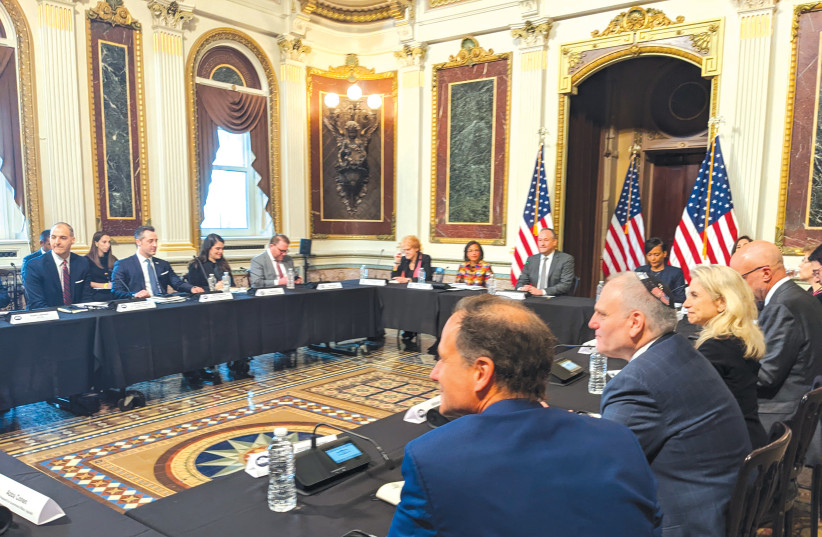America is often described as the greatest place to be Jewish in the Diaspora. With the Jewish Diaspora having now existed for over 2,500 years, this hefty claim not only bears significant weight but also truth. Some have correctly described the Jewish chapter in America as a Golden Age.
Indeed, America has been great to its Jewish community, affording ample opportunities and civil liberties. However, history has demonstrated that for Jews in the Diaspora, the welcome wagon can be fleeting. Jewish communities that once thrived in Spain, Poland, Germany and Iraq for centuries, if not millennia, were effectively extinguished overnight.
Many now fear that history will eventually repeat itself in America, where antisemitism has been rising for the last few years. Jews comprise 2.4% of the United States population but suffer roughly 60% of all religiously-motivated hate crimes.
Last month, two Jews were shot as they left synagogues in Los Angeles, a man reportedly fired blanks in a Jewish Community Center in San Francisco and Neo-Nazis announced a nationwide Day of Hate, harassing Jews beforehand and calling them the N-word, asking if they should be put in an oven and telling them to return to Israel. Hostile flyers filled with age-old tropes are being distributed in cities across the country and we are seeing antisemitism reported by students at their universities and high schools.
Despite such surging antisemitism, there’s room for optimism. As I learned when testifying before Arkansas’s House and Senate Committees, a growing movement of states are willing to fight antisemitism and alter the trajectory of Jewish history in the diaspora. Other states must follow Arkansas’s example and codify the International Holocaust Remembrance Alliance (IHRA) Working Definition of Antisemitism into law to ensure that government bodies can better identify and punish acts of unlawful antisemitism and educate staff to follow suit.

Having just unanimously passed Senate Bill 118, Arkansas has become one of 10 states to have either passed or incorporated the International Holocaust Remembrance Alliance (IHRA) Working Definition of Antisemitism into law, a list now including Republican (Iowa), Democratic (New Mexico) and purple states (Virginia). IHRA bills are now pending in multiple other states and 22 states have also adopted the definition by executive proclamation or legislative resolution. Support for the definition transcends party lines and so must the fight against antisemitism.
As these states recognize, defining antisemitism remains crucial to fighting it, especially when surveys indicate that half of all Americans don’t know what antisemitism actually means. As antisemitism has persisted for millennia, it has evolved to incorporate different themes, making antisemitism difficult to address. The IHRA definition incorporates eleven examples that help identify both classic and contemporary iterations of the world’s oldest hatred, antisemitism.
GIVEN ITS innovativeness, the IHRA definition has become the consensus-driven definition of antisemitism for the Jewish community, being adopted by over 95% of the major American Jewish organizations that comprise the Conference of Presidents. It has been adopted or endorsed by 1,100 entities worldwide, including nearly 40 countries, presidents from Democratic and Republican administrations and various institutions, such as the Global Imams Council, English Premier League and even Lufthansa Airlines.
Promising ideas often have detractors and IHRA legislation is no exception. Antisemites now spread misinformation about efforts to define and combat antisemitism. By keeping antisemitism undefined or under-defined, antisemites can avoid accountability for their acts of bigotry.
IHRA opponents
IHRA opponents often falsely claim that IHRA legislation might infringe upon one’s right to free speech and ability to criticize Israel. This claim is false. Antisemites can still espouse antisemitic and anti-Israel rhetoric. The IHRA definition even notes that, “criticism of Israel similar to that leveled against any other country cannot be regarded as antisemitic.” As noted by SB 118’s lead sponsors Senator Jim Dotson and Rep. Mindy McAlindon, IHRA legislation, such as Arkansas’s, helps state officials identify and address unlawful acts motivated by antisemitism and not free speech.
The IHRA opponents also seek to delegitimize IHRA legislation by misrepresenting that the IHRA definition’s founder opposes its use in policy. In reality, a score of individuals participated in the drafting process and as noted by three of them, virtually all of the definition’s drafters, except one, supported IHRA’s use by those who would put it to use. Such people include those in government and those responsible for identifying and responding to antisemitic hate crimes and other antisemitic events. After all, it’s called a working definition for a reason.
As antisemitism festers worldwide, Americans have a unique opportunity to lead in the fight against antisemitism by codifying a definition that can be used to help government officials fight it. Americans ought to support their state legislators in their unprecedented efforts to combat antisemitism in a manner consistent with the concerns of the Jewish community and ensure that America and its Golden Age continue to remain the best place for the safety of Jewish life in the diaspora.
The writer is the director of policy education at StandWithUs, a non-partisan education organization committed to combating antisemitism and misinformation about Israel and the Jewish people.
